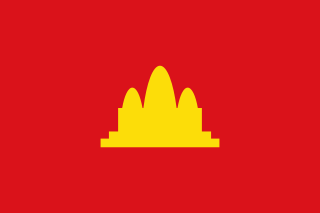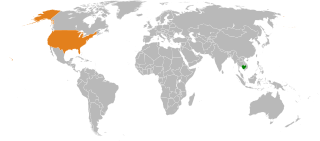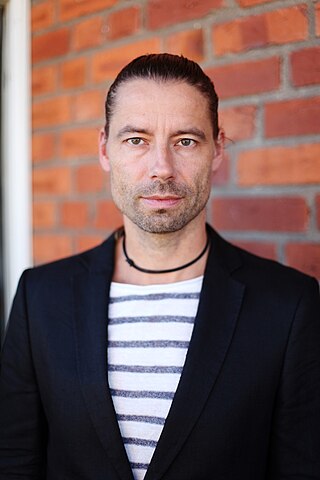
The Khmer Rouge is the name that was popularly given to members of the Communist Party of Kampuchea (CPK) and by extension to the regime through which the CPK ruled Cambodia between 1975 and 1979. The name was coined in the 1960s by then Chief of State Norodom Sihanouk to describe his country's heterogeneous, communist-led dissidents, with whom he allied after his 1970 overthrow.

Pol Pot was a Cambodian revolutionary, dictator, and politician who ruled Cambodia as Prime Minister of Democratic Kampuchea between 1976 and 1979. Ideologically a Marxist–Leninist and a Khmer ethnonationalist, he was a leading member of Cambodia's communist movement, the Khmer Rouge, from 1963 until 1997 and he served as the General Secretary of the Communist Party of Kampuchea from 1963 to 1981. His administration converted Cambodia into a one-party communist state and perpetrated the Cambodian genocide.

The Kingdom of Cambodia, also known as the First Kingdom of Cambodia, and commonly referred to as the Sangkum period, refers to Norodom Sihanouk's first administration of Cambodia from 1953 to 1970, an especially significant time in the country's history. Sihanouk continues to be one of the most controversial figures in Southeast Asia's turbulent and often tragic postwar history. From 1955 until 1970, Sihanouk's Sangkum was the sole legal party in Cambodia.
Benedict F. "Ben" Kiernan is an Australian-born American academic and historian who is the Whitney Griswold Professor Emeritus of History, Professor of International and Area Studies and Director of the Genocide Studies Program at Yale University.

Elizabeth Becker is an American journalist and author. She has written five books and is best known for her reporting and writing on Cambodia.

Chan Sy, also spelt Chan Si, was a Cambodian politician who served as the Prime Minister of the People's Republic of Kampuchea from 1982 until his death in 1984.

Kampuchea, officially known as Democratic Kampuchea from 5 January 1976, was a one-party totalitarian state which encompassed modern-day Cambodia and existed from 1975 to 1979. It was controlled by the Khmer Rouge (KR), the name popularly given to the followers of the Communist Party of Kampuchea (CPK), and was founded when KR forces defeated the Khmer Republic of Lon Nol in 1975.
Harry Elstner Talbott Thayer was an American diplomat who served as the seventh United States Ambassador to Singapore from 1980 to 1985.
Tiv Ol was a Cambodian teacher and communist politician. Ol joined the Kampuchean People's Revolutionary Party in autumn 1959.
Nop Bophann was a Cambodian newspaper editor. He had been one of the representatives of the United Issarak Front in the Viet Minh side of the Joint Commission for the Implementation of the Geneva Accords. In May 1956, Nop Bophann, along with Non Suon and Keo Meas, restarted Pracheachon as a weekly newspaper. Nop Bophann became the editor of the publication. On October 11, 1959, Nop Bophann was shot dead outside a military barrack in Phnom Penh.

Bilateral relations between the United States and Cambodia, while strained throughout the Cold War, have strengthened considerably in modern times. The U.S. supports efforts in Cambodia to combat terrorism, build democratic institutions, promote human rights, foster economic development, eliminate corruption.
The People's Revolutionary Tribunal was a tribunal established by the People's Republic of Kampuchea in 1979 to try the Khmer Rouge leaders Pol Pot and Ieng Sary in absentia for genocide.
Nathaniel Talbott Thayer was an American freelance journalist whose work focused on international organized crime, narcotics trafficking, human rights, and areas of military conflict.
Year Zero: The Silent Death of Cambodia is a 1979 British television documentary film written and presented by the Australian journalist John Pilger, which was produced and directed by David Munro for the ITV network by Associated Television (ATV). First broadcast on 30 October 1979, the filmmakers had entered Cambodia in the wake of the overthrow of the Pol Pot regime.

The Provisional Government of National Union and National Salvation of Cambodia (PGNUNSC) was an internationally unrecognised and ostensibly provisional government set up by the Khmer Rouge on July 11, 1994, in opposition to the established Kingdom of Cambodia.

The Communist Party of Kampuchea (CPK), also known as the Khmer Communist Party, was a communist party in Cambodia. Its leader was Pol Pot and its members were generally known as the Khmer Rouge. Originally founded in 1951, the party was split into pro-Chinese and pro-Soviet factions as a result of the Sino–Soviet split with the former being the Pol Pot faction, and the latter adopting a more revisionist approach to Marxism. As such, it claimed that 30 September 1960 was its founding date, then it was named the Workers' Party of Kampuchea before it was renamed the Communist Party in 1966.

Cambodian genocide denial is the belief expressed by some Western academics that early claims of atrocities committed by the Khmer Rouge government (1975–1979) in Cambodia were much exaggerated. Many scholars of Cambodia and intellectuals opposed to the U.S. involvement in the Vietnam War denied or minimized reports of human rights abuses of the Khmer Rouge, characterizing contrary reports as "tales told by refugees" and U.S. propaganda. They viewed the assumption of power by the Communist Party of Kampuchea as a positive development for the people of Cambodia who had been severely impacted by the Vietnam War and the Cambodian Civil War. On the other side of the argument, anti-communists in the United States and elsewhere saw in the rule of the Khmer Rouge vindication of their belief that the victory of Communist governments in Southeast Asia would lead to a "bloodbath."

The Cambodian genocide was the systematic persecution and killing of Cambodian citizens by the Khmer Rouge under the leadership of Communist Party of Kampuchea general secretary Pol Pot. It resulted in the deaths of 1.5 to 2 million people from 1975 to 1979, nearly a quarter of Cambodia's population in 1975.

Peter Fröberg Idling is a Swedish writer and a literary critic. He graduated from law school and spent two years in Cambodia working as a legal advisor to a human rights organisation. His first book of literary nonfiction, Pol Pots leende, was translated into seven languages and shortlisted for several literary awards. In 2015 it was adapted for the stage and premiered in Berlin.










